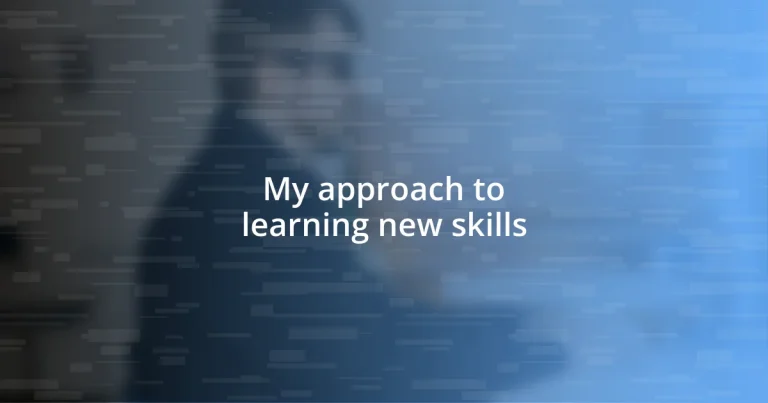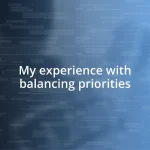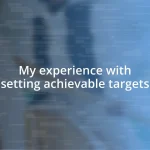Key takeaways:
- Understanding the stages of skill acquisition—cognitive, associative, and autonomous—helps track progress and celebrate small victories throughout the learning journey.
- Setting clear, specific, and measurable learning goals fosters focus and motivation, making it easier to navigate the learning process.
- Seeking feedback and engaging in reflection enhances learning by providing new insights and reinforcing growth through community interaction and self-assessment.
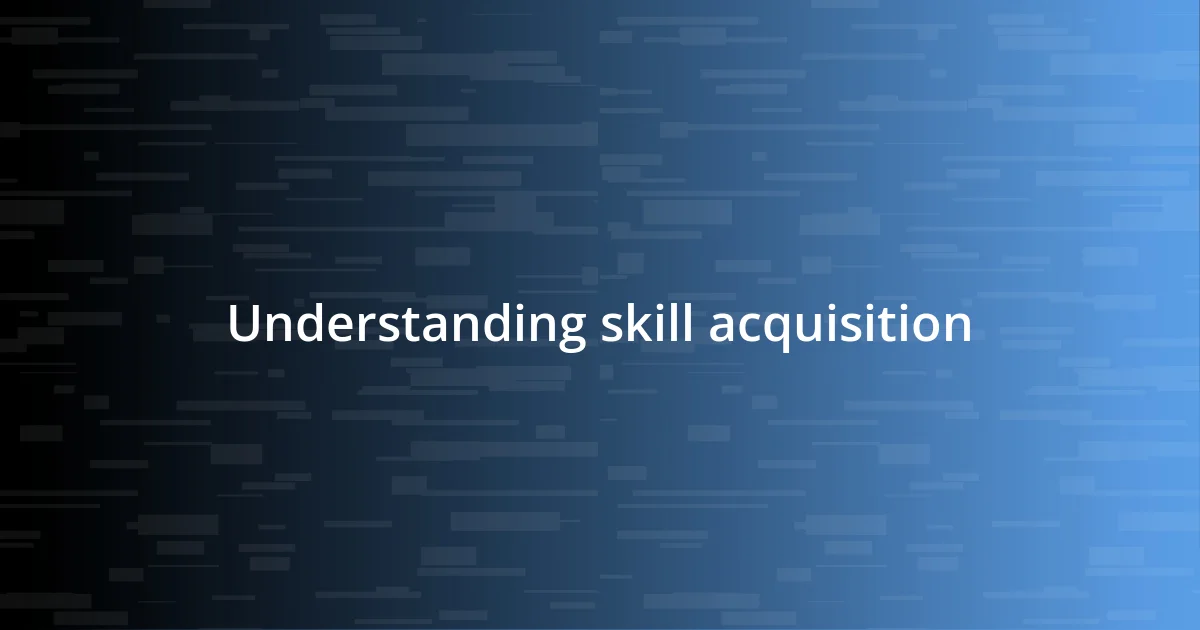
Understanding skill acquisition
Skill acquisition is a fascinating journey that involves both mental and physical components. I remember when I first tried to learn to play the guitar; every strum felt awkward at first. Have you ever felt that initial frustration when you pick up a new skill? It’s a common experience, and it’s a crucial part of the learning curve.
As I delved deeper into this process, I realized that understanding the stages of skill acquisition—cognitive, associative, and autonomous—was vital. Each stage builds on the previous one, and it was enlightening to see how my practice shifted from simply memorizing chords to effortlessly playing my favorite songs. This gradual progression made me appreciate the small victories along the way. Do you celebrate your small wins too?
Moreover, the emotional connection to the skill plays an essential role in how effectively we learn. When I started to write, the joy of expressing my thoughts creatively fueled my desire to improve. If you find a passion tied to what you’re learning, you might discover that the road to skill acquisition becomes more enjoyable and rewarding. How do you think emotion influences your learning experiences?
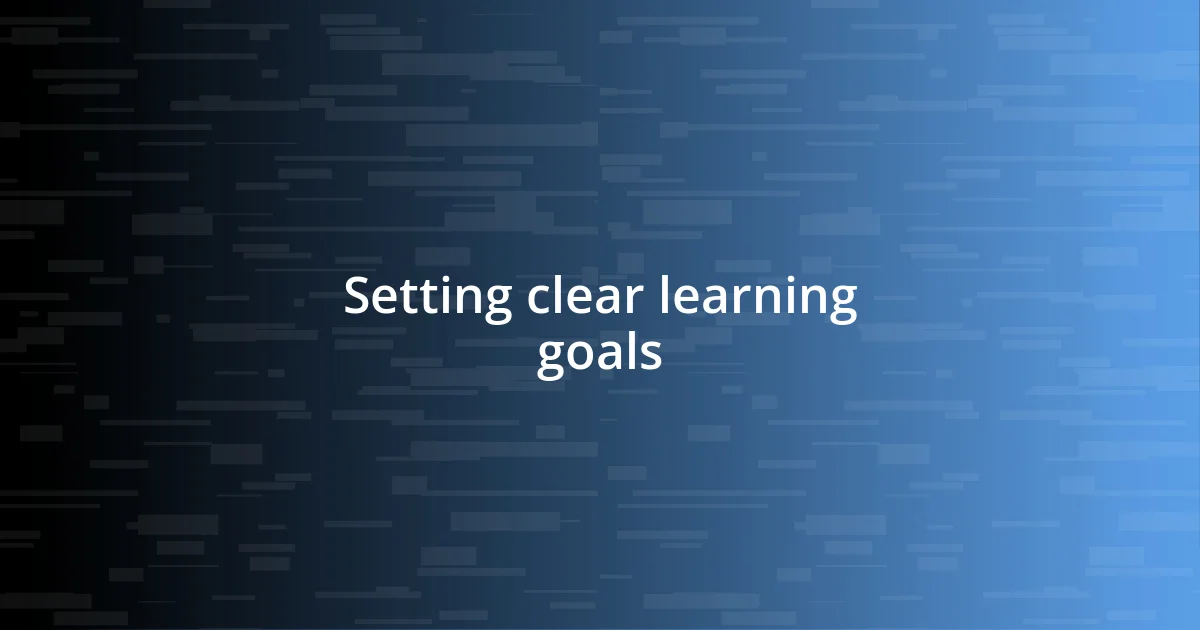
Setting clear learning goals
Setting clear learning goals is a fundamental step in any educational journey. When I embarked on learning photography, I made it a point to define specific targets, like mastering portrait lighting and experimenting with composition by the end of the month. This clarity transformed my focus and allowed me to track my progress more effectively.
Here’s a quick overview of how to set your learning goals:
- Be Specific: Instead of saying, “I want to get better at cooking,” specify, “I want to perfect my pasta-making skills by trying a new recipe each week.”
- Make Them Measurable: Quantify your goals, like “I will complete 10 online tutorials on graphic design by the end of the quarter.”
- Set Achievable Goals: Choose goals that challenge you but are still attainable. I found that breaking down larger tasks, like writing a short story, into smaller sections made it less overwhelming and more feasible.
- Relevant to Your Interests: Ensure that your goals align with what truly excites you. I learned joyfully when my writing goals connected with the themes I felt passionate about.
- Time-Bound: Deadlines help create a sense of urgency. When I set a goal to finish a painting before an upcoming gallery night, it not only motivated me but also sparked newfound creativity.
Establishing these goals not only drives motivation but also helps maintain focus amidst distractions. I’ve noticed that when I revisit and adjust these goals regularly, I can adapt my learning journey, making it even richer and more fulfilling. What unique learning goals motivate you?
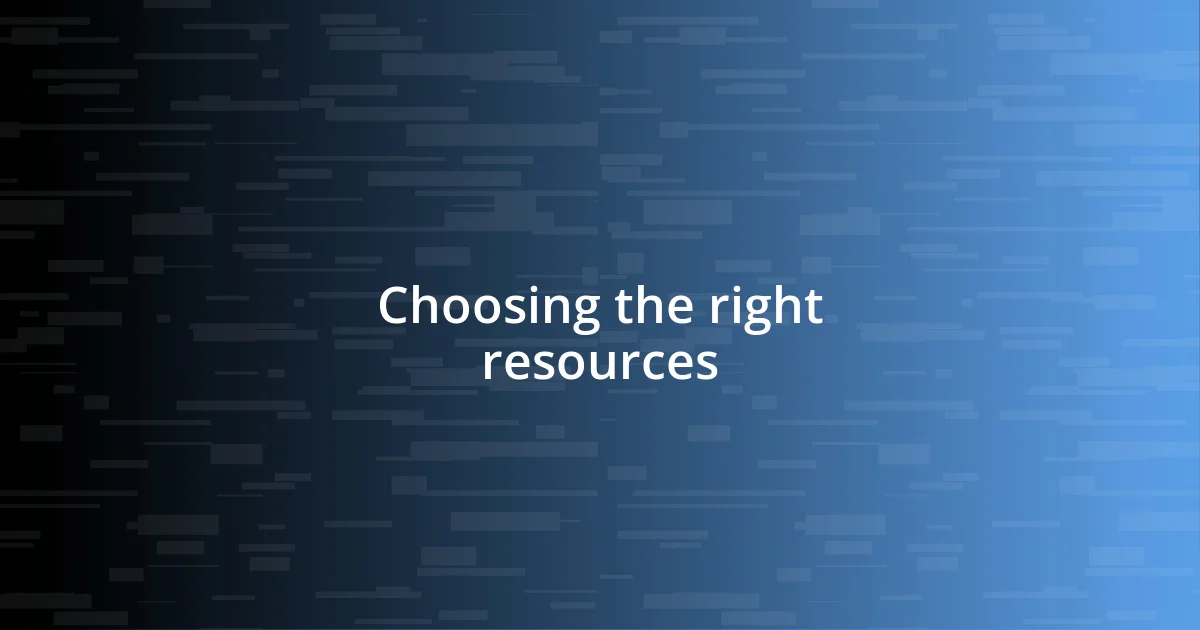
Choosing the right resources
Choosing the right resources can make all the difference in your learning experience. When I was learning to cook, I spent hours searching through online recipes, cookbooks, and even YouTube channels. I noticed that while some resources provided basic techniques, others went deeper into the art of cooking, which I found really helpful. Have you ever felt overwhelmed by too many choices? Focusing on curated, high-quality resources helped me cut through the noise and zero in on what truly mattered for my growth.
One important factor to consider is the type of resource that best suits your learning style. For instance, I’ve always preferred interactive platforms for practical skills, such as learning to play a musical instrument. Watching someone demonstrate a technique in real time gives context that text alone can’t convey. Meanwhile, others might thrive with books or written guides. Reflecting on your own style can help you choose resources that truly resonate with you.
Lastly, don’t underestimate the value of community resources, whether through local classes or online forums. I remember attending a weekend workshop that not only helped me develop my painting skills but also connected me with fellow enthusiasts. Engaging with others can deepen your understanding and inspire growth. Have you ever considered how much community learning can enhance your experience?
| Resource Type | Suitability |
|---|---|
| Online Tutorials | Best for visual and auditory learners who prefer step-by-step guidance. |
| Books | Ideal for those who enjoy in-depth knowledge and a structured approach. |
| Community Workshops | Great for experiential learning through interaction and feedback. |
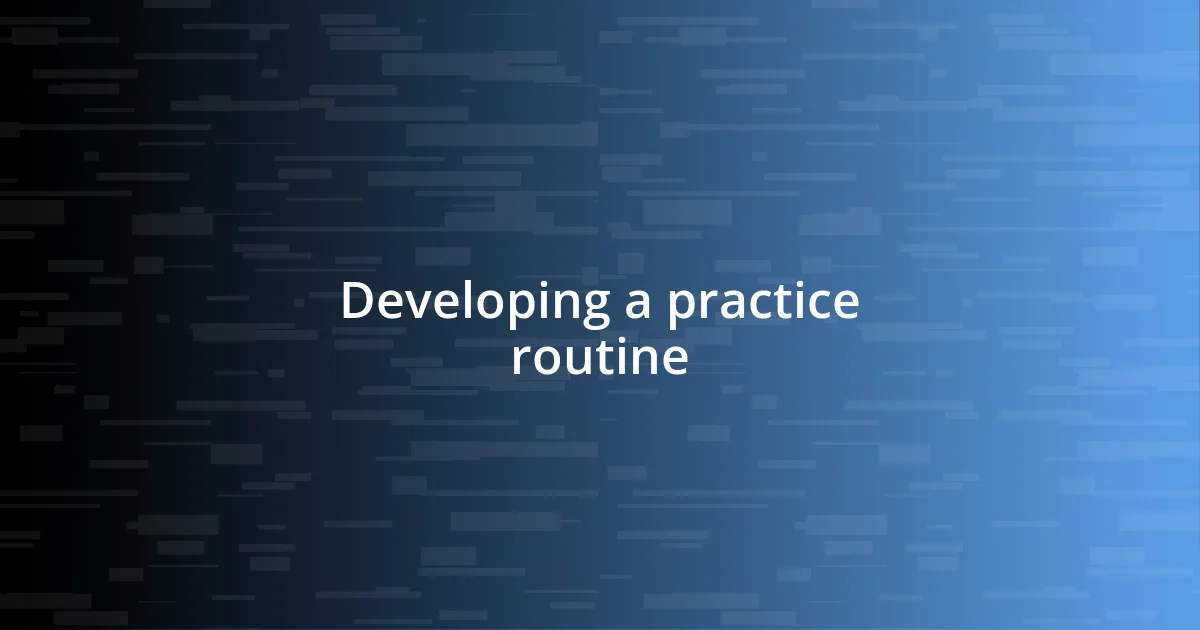
Developing a practice routine
Developing a regular practice routine is essential for mastering any new skill. When I set out to learn guitar, I quickly discovered that consistency was key. I dedicated 30 minutes each day, and those short sessions added up. It was surprising how much progress I made over just a few weeks! Have you ever noticed how a small daily commitment can yield significant results?
To keep my practice engaging, I mixed routines based on what I was learning. On some days, I’d focus on scales, while others were reserved for learning new songs. This variety made each session feel fresh and exciting. I remember the thrill of finally nailing a chord progression that had seemed impossible just days before. What techniques do you use to keep your practice engaging?
Scheduling my practice at the same time each day helped me build the habit. I chose mornings when my mind felt clear, allowing me to retain what I practiced more effectively. Over time, this routine not only enhanced my skills but also became a cherished part of my day. What is your favorite time to practice and why?
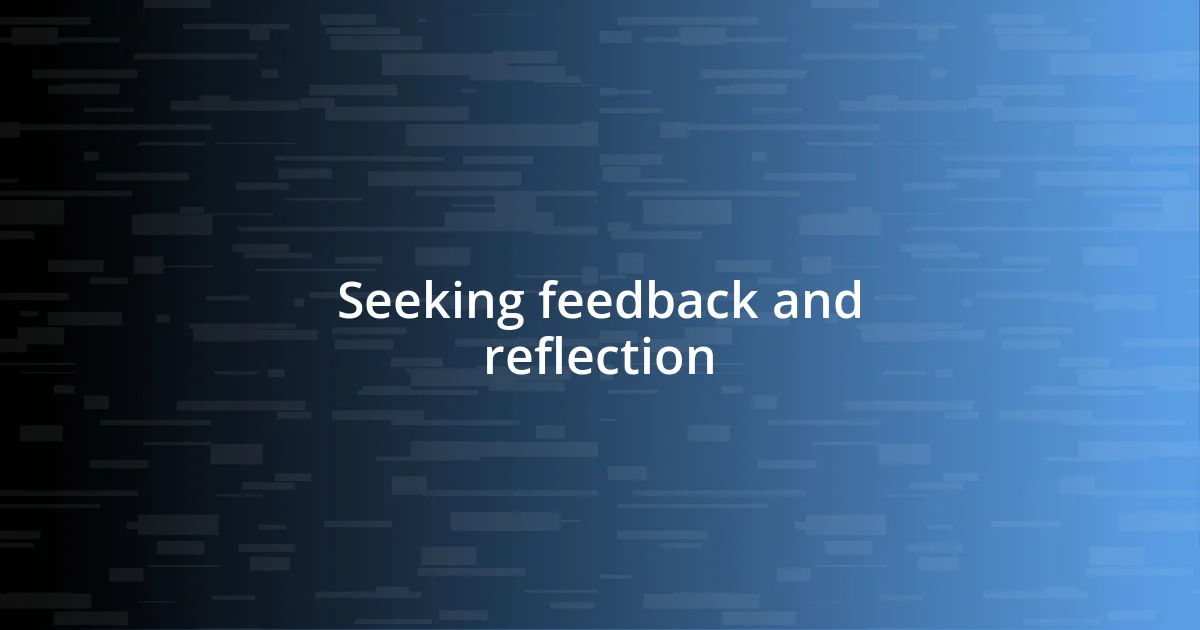
Seeking feedback and reflection
Seeking feedback and reflection is a crucial part of my learning process. I often find myself asking friends or mentors for their thoughts on my progress. One instance stands out: after I completed a painting, I hesitated before showing it to others. Their encouragement not only boosted my confidence but also provided insights I had never considered, which ultimately improved my work. Have you ever held back sharing something you were proud of, only to find that feedback made it shine even brighter?
Reflection takes on many forms for me, but journaling has become a go-to tool. After each practice session, I jot down what went well and what I can improve. This simple act allows me to process my experiences deeply and track my growth over time. Looking back through my entries, I’ve spotted patterns in my learning style that have guided my subsequent efforts. How often do you take the time to reflect on your learning journey?
Feedback isn’t limited to formal reviews; it can emerge from casual conversations too. I remember discussing my progress in a casual café with a fellow artist. Their critical yet constructive comments opened my eyes to aspects of my technique I hadn’t noticed before. This dialogue turned out to be a turning point, reinforcing the idea that learning often thrives in a community. Do you share your challenges with someone who can give you a fresh perspective?
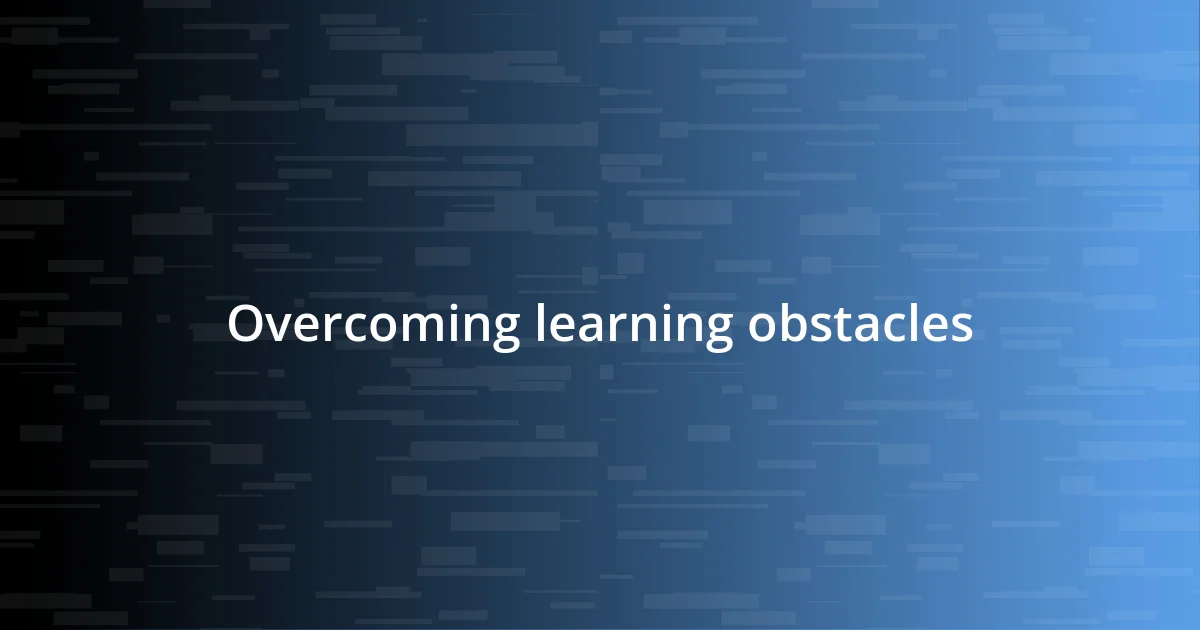
Overcoming learning obstacles
Overcoming learning obstacles is something I’ve faced time and again. For instance, when I first attempted to learn a new language, the vast array of vocabulary and grammar rules felt overwhelming. It was demotivating at times, but I learned to break my learning into bite-sized chunks, focusing on just a few words or a simple structure each day. Have you ever felt that sense of dread when faced with too much information? Simplifying my approach helped to turn that dread into a sense of accomplishment as I gradually pieced together my knowledge.
One of the biggest hurdles I encountered was fear of failure. I vividly remember my first public speaking event; my hands were shaking, and my mind raced. However, I discovered that embracing vulnerability was a powerful tool. Sharing my fears allowed me to connect with the audience, which transformed my anxiety into excitement. Isn’t it amazing how authentic connections can turn obstacles into opportunities for growth?
Lastly, I realized that external pressures often stifle my learning. While aiming for perfection can propel us forward, it can also cause paralysis. I took a step back and reminded myself to celebrate my small victories. Each time I acknowledged those little accomplishments, I felt motivated to keep pushing through challenges. What small wins have you celebrated that kept you moving towards your goal?
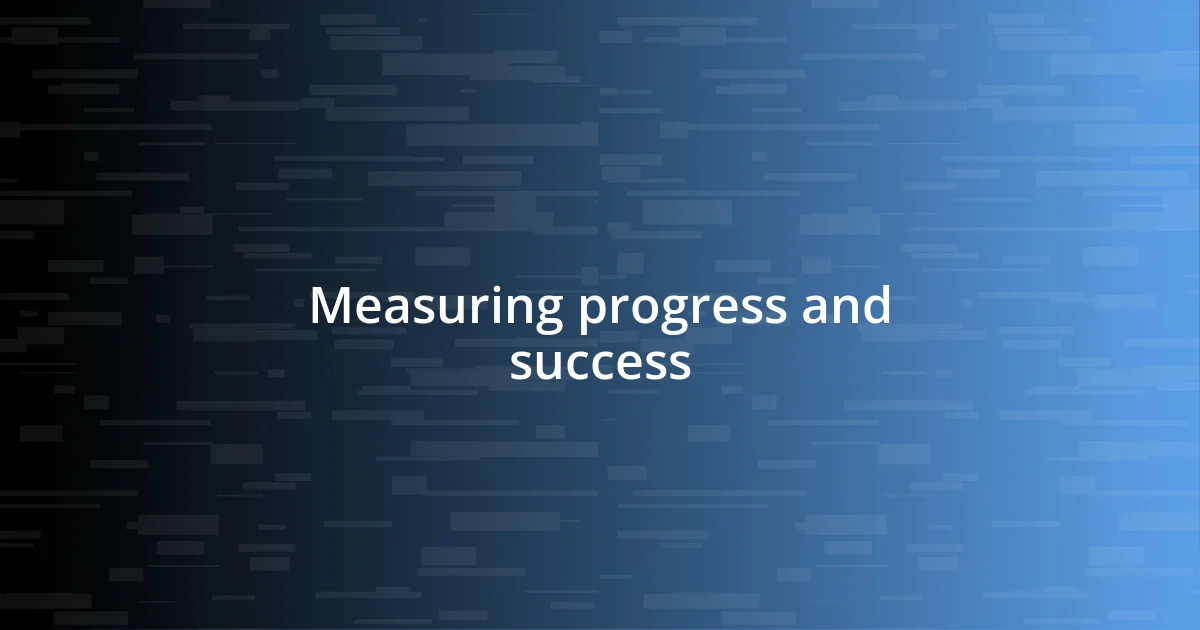
Measuring progress and success
Measuring progress and success is a multifaceted journey for me. I often gauge my advancement through goal-setting and tracking milestones. For example, when I learned to play the guitar, I set small, achievable targets, like mastering a new chord each week. It was gratifying to check those off, making the broader goal of performing in front of friends feel less daunting. Have you ever felt that surge of satisfaction when you notice how far you’ve come?
In addition to setting goals, I make it a point to celebrate my successes—no matter how small. I recall the thrill of recording my first complete song. It wasn’t perfect, but the mere act of finishing it felt monumental. Sharing that moment with friends who cheered for me reinforced the idea that success isn’t always about perfection. Instead, it’s about recognizing the effort and progress along the way. What moments of success have you celebrated that energized your learning journey?
Reflection plays a critical role in measuring progress, too. After completing a challenging project, I take some time to evaluate not just the outcome, but the process I went through. I remember looking back on my first cooking class, realizing how much I had learned from initial mistakes with timing and seasoning. Documenting these insights helps crystallize what works for me, ultimately guiding future endeavors. Do you ever look back and find lessons hidden within your perceived failures?












